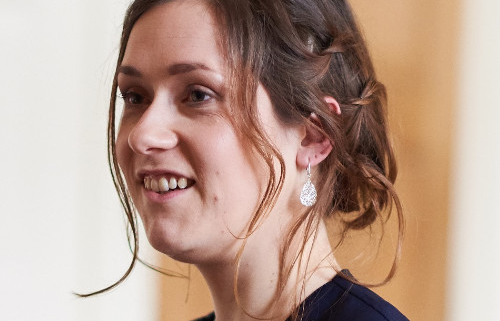What is PhD success and does it imply a deliberate risk for your mental and social health? (1)

dr. Els van Rooij
Dr. Els van Rooij investigates PhD trajectories for the Graduate School at Groningen University. In particular, she focusses on success factors in PhD research projects. Key topics are working pressure and mental wellbeing of PhD candidates, as well as social aspects of the academic working environment and the supervisory relationship.
This is an interview with Dr. Els van Rooij (postdoctoral researcher at Groningen University) by Dr. Claartje van Sijl (independent career coach for academics). The interview was conducted via several emails back and forth. This part, part 1 focuses on PhD success. In part 2 we examine the working pressure that young researchers experience and its effect on their PhD success, work/life balance and mental wellbeing.
Claartje: you investigate success factors in research projects, and in particular in PhD projects. How do you define success in a PhD project?
Els: In our study, we use several indicators to measure if someone is a successful PhD student. First of all, we look at timely completion. Many PhD students take longer than the usual 4 years to complete their thesis, which has negative consequences both for the university and for the PhD student – because it also means a delay in the start of the next career step and it can cause problems if the PhD student’s contract has already ended.
Next to timely completion, we also look at dropout: whether or not the PhD student finishes at all. Third, we look at PhD students’ satisfaction with their PhD trajectory, and fourth, we look at PhD students’ mental health. Although these latter two indicators are of course not directly a measure of success, we believe satisfaction and being mentally healthy are too important to ignore. If someone finishes perfectly in time, but has managed to do this by working 80 hours a week, neglecting their social and personal life, and by constantly being on the verge of a burnout, I wouldn’t say this is a successful PhD student.
Fifth, in a later phase of our research project we also want to look at PhD students’ transition to the labour market – especially outside of academia – after finishing the PhD. About 70% of doctoral holders will have a career outside of academia, whereas doctoral education is still in many aspects focused on preparation for an academic career. So it is important to gain insight into which skills these people are missing (if any) and how doctoral education can prepare them better for the work life outside of the university.
Claartje: Absolutely, finishing a PhD project, and doing so in time is a huge success, so that is rightly the first indicator to use. But PhD success should not be limited to the PhD thesis itself. It should also include the PhD holder as a professional and as a person. Awareness about that increases with the growing attention to mental wellbeing of PhD’s and the need to better prepare PhD candidates for the non-academic labour market. We are slowly realizing that we need a broader, updated vision of PhD success to underpin PhD policy and PhD support. After all, what is the value of a more or less innovative PhD thesis completed within the allotted time, when the PhD holder is reduced to a human wreckage in the process?
Speaking of innovation, how do you see your research informing research policy of graduate schools and funding bodies such as NWO? I notice that you do not mention criteria such as quality and innovativeness of the PhD study or of the PhD candidate as indicators of PhD success. These criteria feature prominently in ratings for funding schemes such as the Innovation Impuls from NWO. Would or should there be, in your view, a relation between PhD success and characteristics of research excellence as deployed e.g. by NWO? And if so, how?
Els: It is correct that in our current research we do not focus on the academic quality and innovativeness of the PhD thesis. First, we thought about including these aspects, but a lot of practical difficulties came to mind. How would we define the quality and innovativeness of a PhD student’s research? What kind of criteria would we use? It would take a lot of time to define this, to operationalize this, and then to apply these criteria to the PhD students’ research and to connect these data to the other data we have gathered about PhD students. Issues of anonymity also come up if we would do this. So we deliberately choose to leave this out and to focus more on the personal aspects, i.e. on the PhD student.
Claartje: what are three most important factors that contribute to PhD success?
Els: In our current data we have information about PhD students’ progress (i.e., being on schedule, we will use this as a proxy for timely completion), on how often they considered to quit the PhD (we will use this as a proxy for dropout), and on their satisfaction. Factors that were included as possible predictors of progress, considering to quit, and satisfaction were background factors, supervision characteristics, project characteristics, and psychosocial factors.
Three project characteristics were significantly related to progress. First, the amount of freedom the PhD student has (e.g. in the project design, and in making decisions about the direction of the project or the methods to be used) was positively related to progress. Second, the perceived workload had a negative impact. Third, students who indicated they were working on a stand-alone project (i.e. they were the only one in the department working on that topic) were more often behind schedule.
When considering to quit was the outcome measure, many factors played a role. First, the background factor nationality mattered: non-European students less often considered to quit than Dutch students. Second, three supervision characteristics had a significant impact on how often a PhD student considered to quit. Students who experienced a low level of academic support from their supervisors and perceived the relationship with their supervisor to be bad more often considered to quit. Also, high expectations (e.g., the supervisor expecting the PhD student to publish in high impact journals only, expecting all chapters of the thesis to be published before defending, etc.) were related to considering to quit. Third, the psychosocial factor sense of belonging played a role: students who did not feel at home in their department more often considered to quit.
When we used satisfaction as an outcome measure, the supervision characteristic relationship was again important: PhD students who reported a better relationship with their supervisor were also more satisfied. Three project characteristics also played a significant role: freedom was positively related to satisfaction, workload negatively, and working on a project that is closely related to the supervisor’s research also positively. Last, the psychosocial factor sense of belonging was positively related to satisfaction.
To sum this up, if you look at predictors that impacted at least two of the outcomes, the following factors are the most important in influencing doctoral success: the amount of freedom in the project; the workload; the relationship with the supervisor; and a sense of belonging.
Claartje: That is an interesting dynamic between freedom and autonomy in the project. Let’s discuss that in more detail later. I am not surprised that non-European students are less likely to quit. I know quite a few cases from my own coaching practice of international PhD’s who were more horrified by the thought of having to return to their home countries than they were of staying put in a desperate PhD project. Reasons range from their positive evaluation of the natural environment of their PhD institution to the dire social-economic situation in their home countries as well as socio-cultural issues such as having to face their family and friends as a “failed PhD candidate”.
The relationship with the supervisor, and in its wake the sense of belonging are key to PhD success. It is quite a responsibility for supervisors, really, and an art to guide PhD candidates well, with just the right amount of support and trust, critical feedback and challenging expectations. The balance differs individually and there is no fixed recipe. From giving trainings on “Managing your supervisor” I have also learned that many PhD candidates are in the process of figuring out what kind of guidance they need and how to communicate that to their supervisors. Part of this is life experience and self-knowledge, part of it can be taught through trainings.
Too often, however, the supervisory relationship is still shaped like the old master / apprentice relationship in the guild of academics. PhD candidates have a very vulnerable position, growing towards independence while at the same time depending completely on their supervisor’s approval. I elaborate this somewhat in my opinion piece on the world in which PhD candidates live, on Scienceguide. What happens, e.g., when the PhD candidate decides that she’d rather not continue her career within the guild, following in her master’s footsteps, but wants to transition to a career outside academia? I regularly see struggling PhD candidates on the verge of dropping out who suddenly realize that they no longer feel like they belong, who notice a kind of “you are not one of us” quality in the working relationship with the supervisor. Obviously, this also has repercussions for their mental wellbeing and the perception of their workloads.
I would be interested to hear your opinion, from your research and / or from your own experience, about the impact of the highly critical communication culture in academia on this sense of belonging, on the supervisory relationship and on the mental resilience of the PhD candidate. Do you have any recommendations on strategies to update the out-dated guild-like relationships between PhD candidates and their supervisors?
Els: I definitely think the critical communication culture has an impact on PhD students’ sense of belonging. Some PhD students may not feel comfortable in such a culture, particularly those who do not have much resilience. I think that in many departments you need a high level of resilience in order to make it. However, I think it wouldn’t be fair to apply the label of a negative, highly critical environment to all institutes. There are large differences between institutes, depending on background factors such as the field, but mainly on the professors who lead the institutes. I think some professors do a great job in creating a positive culture in their group where PhD students don’t feel like failures or imposters if they experience fallbacks or do not manage to publish a lot or not fast enough. I think this is crucial. Besides the environment in the institute, the supervisory relationship of course also matters in this regard. Having a very critical supervisor who is never satisfied will affect your mental health. Your level of resilience and the environment of your research group can then act as buffers, as protective factors. But if you lack resilience and the atmosphere in your group is negative, then I think you’ll have a very hard time during your PhD.
I think the guild-like relationships are only negative if you have a bad relationship with your supervisor, if your supervisor is only focused on preparing you for an academic career, and if you only have one supervisor (so only one ‘role model’, only one source of knowledge and support, and you’ll only be coached in one specific way). If none of these are the case, then I think the guild-type model of supervision can be positive. If you would move to models based on group supervision, there would be the risk that individual PhD students do not get sufficient attention. Moreover, research projects may differ too much for group-based supervision. So my point is that I think a balance between the old master-apprentice system and group-based supervision (i.e. there are many masters and many apprentices and they all learn from each other) would be ideal.
Claartje: what is the influence of the personal development / leadership of young researchers on their PhD success, i.e. the personal transformation process as distinguished from the content-related aspects of the research project and the development of content-specific skills?
Els: I cannot really say anything about leadership and personal development, as this is not a focus point of our studies. I do however see a clear trend that universities focus more and more on the development of transferrable skills in PhD students – as opposed to only focusing on content-specific research skills. I think this is a very good development, especially for those PhD students who will make the transition to a career outside of academia.
Claartje: Yes, I agree that PhD training needs to include much more than content-specific skills. At the same time I notice a certain tension between the professed new focus on preparing PhD students for a career outside of academia (Rathenau Institute, finding 8) and your findings on the impact of the sense of belonging on PhD success. It is conducive to your PhD if you feel like you belong with the academic culture, yet this same academic culture often celebrates an extremely narrow path to professional success, namely the path to tenured, full professorship — across the scientific spectrum but most evident in the Humanities. What is your view about that?
Els: I don’t think there is such a tension, because in our measure of sense of belonging we focus on someone feeling comfortable and welcome in their department, which means that he or she has good and supportive relationships with his or her colleagues. Basically, you could ask any employee about his or her sense of belonging in the work environment – this measure is not focused on feeling at home or not in the academic environment.
Now that you raise this point, I do think it would be interesting to measure PhD students’ sense of belonging in the academic culture. I expect that those students who feel like they belong there will be the ones who continue in academia and that the ones who dislike it will chose to leave after having obtained the dr. title. To put it even stronger, I think a main reason for people to leave academia is the academic culture and all its downsides such as the high work pressure, high level of competition, and focus on academic output.
You have reached the end of part one. Stay tuned for part 2!




Plaats een Reactie
Meepraten?Draag gerust bij!